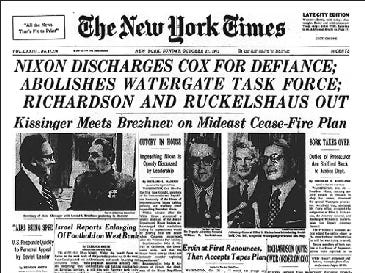This Day in Legal History: Saturday Night Massacre
On October 20, 1973, a pivotal event in American legal and political history unfolded: the “Saturday Night Massacre.” Special Prosecutor Archibald Cox was fired by Solicitor General Robert Bork at the direct order of President Richard Nixon. Nixon’s decision came after both Attorney General Elliot Richardson and Deputy Attorney General William Ruckelshaus refused to carry out the order and instead chose to resign. Cox had insisted on obtaining White House tapes related to the Watergate break-in, and Nixon, citing executive privilege, ordered him removed.
The dismissals plunged the Justice Department into chaos and sparked widespread public outrage. Nixon’s actions were viewed by many as a blatant abuse of power and a threat to the independence of the justice system. Congress was inundated with demands for Nixon’s impeachment, and confidence in the executive branch eroded further. Though Bork ultimately carried out the dismissal, he later stated he believed it was his duty to preserve the functioning of the Justice Department.
The fallout from the Saturday Night Massacre significantly intensified the Watergate investigation. Within months, new Special Prosecutor Leon Jaworski was appointed, and he continued the push for the tapes. Eventually, the U.S. Supreme Court ruled unanimously in United States v. Nixon (1974) that Nixon had to turn them over. The tapes revealed evidence of a cover-up, which led directly to Nixon’s resignation in August 1974.
President Trump commuted the federal prison sentence of former U.S. Representative George Santos, ordering his immediate release. Santos, who had been sentenced in April to over seven years for fraud and identity theft, was serving time for falsifying donor information and inflating fundraising figures to gain support from the Republican Party during his 2022 campaign. His short and controversial congressional tenure ended in expulsion following numerous scandals, including false claims about his education, employment history, and family background.
Trump announced the commutation on Truth Social, arguing that Santos had been “horribly mistreated” and drawing comparisons to other “rogues” in the country who do not face such lengthy prison terms. Earlier in the week, Santos had publicly pleaded for clemency, praising Trump and expressing remorse for his actions. The commutation fits into a broader pattern of Trump’s second-term use of clemency powers, which included mass pardons of January 6 defendants and relief for political figures from both parties. The Constitution grants the president wide authority to issue pardons or commute sentences for federal offenses.
Trump commutes prison sentence of former lawmaker George Santos, orders him released | Reuters
A proposed class action lawsuit was filed in federal court in Connecticut, accusing eight major U.S. banks—including JPMorgan Chase, Bank of America, Wells Fargo, Citibank, and U.S. Bank—of conspiring to fix the U.S. prime interest rate for over three decades. The plaintiffs, representing potentially hundreds of thousands of borrowers, claim the banks coordinated to align their prime lending rates with the Wall Street Journal Prime Rate, which is typically set at three percentage points above the federal funds rate. This rate influences trillions of dollars in consumer and small-business loans, such as credit cards and home equity lines.
The suit alleges that this coordination inflated borrowing costs for consumers and small businesses, who were led to believe the rates were set independently. It also asserts that up until 1992, the Wall Street Journal published a range of prime rates that reflected competitive differences among banks, but since then has moved to publishing a single rate derived from input by a select group of large banks. Although the Wall Street Journal and Dow Jones are not named as defendants, the lawsuit challenges the transparency and independence of the current rate-setting process.
Plaintiffs argue that decades of nearly identical prime rate pricing among the banks defies the notion of independent rate-setting. The banks named in the case have not yet made court appearances and mostly declined to comment. The suit, Normandin et al v. JPMorgan Chase Bank N.A. et al, aims to hold the institutions accountable for what plaintiffs call a longstanding, anti-competitive scheme.
Borrowers sue major US banks over alleged prime rate-fixing scheme | Reuters
Chief Judge Colm F. Connolly of the U.S. District Court for Delaware issued a ruling that could significantly alter how early-stage patent litigation is handled, particularly regarding willful infringement claims. Reversing his earlier stance, Connolly held that requests for enhanced damages due to willful patent infringement are not standalone claims subject to early dismissal if the underlying infringement claims proceed. The decision came in a case involving clot-removal device patents, Inari Medical Inc. v. Inquis Medical Inc.
This shift may complicate early settlements by increasing uncertainty and widening the valuation gap between plaintiffs and defendants. Because Delaware is a leading venue for patent disputes, Connolly’s ruling may influence how courts across the country handle similar motions, although it’s uncertain whether other judges will adopt the same reasoning. Legal scholars and practitioners note the opinion could lead to more aggressive pre-suit tactics from patent holders, such as sending demand letters alleging willfulness, which could provoke accused companies to initiate preemptive litigation in favorable jurisdictions.
Connolly’s approach represents a sharp departure from his prior treatment of willfulness claims and, according to experts, effectively lets plaintiffs include such allegations in their complaints without risk of early dismissal. However, the ruling also reaffirmed that plaintiffs still need to establish pre-suit knowledge of the patents to succeed on claims of post-suit willfulness or indirect infringement.
Connolly’s Willfulness Ruling Risks Scuttling Patent Settlements













